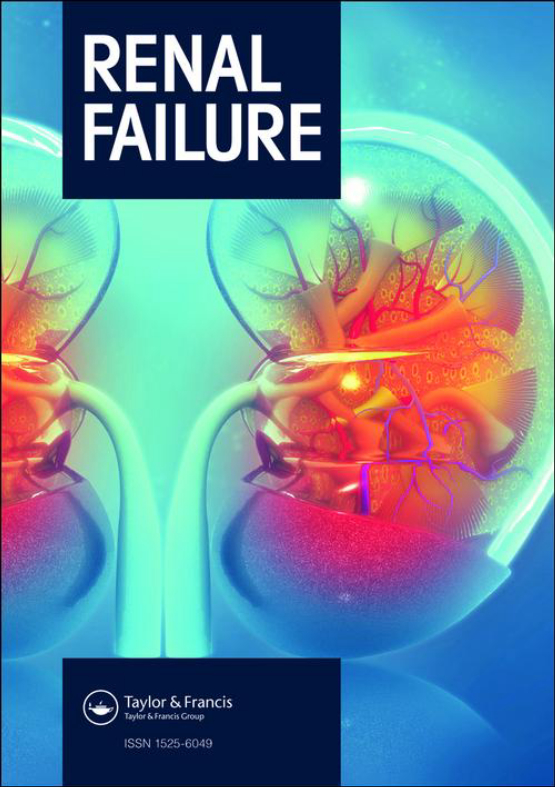Submit a Manuscript to the Journal
Renal Failure
For an Article Collection on
Mitochondria: An Old-New Link in the Progression of Renal Disease
Manuscript deadline
30 September 2024


Article collection guest advisor(s)
Prof. Monika Gooz,
Medical University of South Carolina, USA
Prof. Eduardo N. Maldonado,
Medical University of South Carolina, USA
Mitochondria: An Old-New Link in the Progression of Renal Disease
Kidneys are highly active organs that not only remove waste but regulate salt-water balance, electrolyte homeostasis, blood pressure, the number of red blood cells and vitamin D level. The high metabolic activity demands high energy production and at the same time, a controlled production of reactive oxygen species necessary for normal cellular signaling. Kidney cellular metabolism is supported by both mitochondrial bioenergetics and glycolysis. The metabolic pathways utilized are different in various parts of the nephron. In rapidly dividing cells, mitochondrial function is partially suppressed whereas glycolysis is upregulated to provide biomass for newly synthesized molecules. ATP synthesis in mitochondria occurs through a process called oxidative phosphorylation. Mitochondria are also involved in calcium and iron homeostasis and are the main cellular source of reactive oxygen species that regulate cell survival and death.
Mitochondrial dysfunction has been proposed to be either a cause or a consequence in kidney pathophysiology. Because of the limited regenerative capability of the kidney, an imbalance of these functions makes it vulnerable to diseases. A better understanding of mechanisms underlying mitochondrial adaptation or dysfunction during the pathogenesis of the various kidney diseases may lead to improved diagnosis and novel therapies. Pharmacological manipulation of mitochondrial metabolism and cellular bioenergetics to preserve renal function, or revert damages caused by metabolic imbalance, became a topic of high interest in recent years.
This special announcement aims to provide a collection of articles relevant to renal mitochondrial bioenergetics and mitochondrial metabolism. Contributions that present new hypotheses, novel observations, analyze mitochondrial dysfunction in renal diseases or propose novel drug developments are of interest.
Subtopics included are: Mitochondrial dysfunction in
1. Acute renal diseases;
2. Kidney transplant;
3. Chronic renal diseases including diabetic renal disease;
4. Mitochondrial bioenergetics in genetic renal diseases;
5. Age-related changes in mitochondrial metabolism in the kidney.
All article types that are in the scope of the Journal are welcome.

Keywords: bioenergetics, mitochondrial redox state, mitochondrial biogenesis, kidney failure, mitochondrial dynamics
Guest Advisors
Monika Gooz, M.D. Ph.D. is an Associate Professor at the Department of Drug Discovery and Biomedical Sciences and a Chan Zuckerberg Imaging Scientist at the Cell and Molecular Imaging Core as well as the Drug Discovery Core at the College of Pharmacy of the Medical University of South Carolina (MUSC), Charleston, SC. She has extensive experience in the use of advanced imaging approaches for visualization of protein interactions and metabolic changes in several cellular and animal models including polycystic kidney diseases and cancer.
Eduardo N. Maldonado, DVM, Ph.D. is an Associate Professor at the Department of Drug Discovery and Biomedical Sciences at the Medical University of South Carolina (MUSC), Charleston, SC. His main research focus is the study of mitochondrial metabolism and cellular bioenergetics in cancer and other diseases. His research aims to understand the biology of mitochondrial function and to identify potential mechanisms that could be used to develop drugs that modify cellular metabolism.
Disclosure Statement: Prof. Gooz and Prof. Maldonado declare there is no conflict of interest.
All manuscripts submitted to this Article Collection will undergo a full peer-review; the Guest Advisor for this Collection will not be handling the manuscripts (unless they are an Editorial Board member).
Please review the journal scope and author submission instructions prior to submitting a manuscript.
The deadline for submitting manuscripts is September 30, 2024.
Please contact Ruby Ru at [email protected] with any queries and discount codes regarding this Article Collection.
To submit your papers to this Article Collection, please:
- Check "yes" for the question, "Are you submitting your paper for a specific special issue or article collection?"
- Select the relevant Article Collection from the drop-down menu under the question, "Special Issue or Article Collection Name."
Benefits of publishing open access within Taylor & Francis
Global marketing and publicity, ensuring your research reaches the people you want it to.
Article Collections bring together the latest research on hot topics from influential researchers across the globe.
Rigorous peer review for every open access article.
Rapid online publication allowing you to share your work quickly.
Looking to Publish your Research?
Find out how to publish your research open access with Taylor & Francis Group.
Choose open accessSubmission Instructions
All manuscripts submitted to this Article Collection will undergo desk assessment and peer-review as part of our standard editorial process. Guest Advisors for this collection will not be involved in peer-reviewing manuscripts unless they are an existing member of the Editorial Board. Please review the journal Aims and Scope and author submission instructions prior to submitting a manuscript.